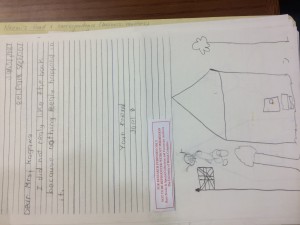Hey bloggers, as everyone is obviously writing the same thing, I suppose I don’t need much of an intro. For any that possibly don’t know, our ASTU class ventured into UBC’s archives. We had all of Joy Kogawa’s fond available to us, which was quite interesting. I don’t know if other schools have similar archives, but it is cool to know that we have this available at any time. To be completely honest, I am not sure how much use I will get out of it personally, but this is a great tool for English and literature students I’m sure. One of the things that struck me was the old newspapers. It was so bizarre to see the language and the culture of that time period. We could see a lot of words such as “Japs”, and all the advertisements were typical of the 80’s. However, what I was really interested in were Kogawa’s drafts. When versions of the book are right in front of you, with the author’s handwriting on the page, there is a feeling of satisfaction, of authenticity. In my visual arts class, we talk a lot about paintings and pictures and how the internet has possibly decreased the value of these artworks by democratizing them. For example, the Mona Lisa, worth millions of dollars, can be found on the internet by the click of a button. It is somewhat the same with Joy Kogawa’s Obasan. Since we are all reading these printed versions that hundreds of students have also read, one does not think much about the author or the process. Seeing the process through which she wrote, and knowing that this piece of paper is an original, and only one exists, really shines a new light on the book. It’s almost as if you can put yourself in her shoes for a second, and relive the creation of an award-winning novel. Again, I am not sure how much use I will get out of these archives, but I am grateful for the experience. And if I do ever decide to use it, I know what to do. 
Here is a picture taken of a letter sent by an elementary school student to Kogawa that I thought was quite humorous to provide a little bit of comic relief to my blog. It reads “Dear Mrs. Kogawa, I did not realy like the book because nothing realy happend in it. Your friend Joel.” (spelling mistakes intentional)
Thanks for reading, and as always, blogging off.
Ryan Bednar
Works Cited
Unknown, Joel. Letter from Joel (last name unknown) to Joy Kogawa. N.d. Box 12 File 2. Joy Kogawa fonds. University of British Columbia Library Rare Books and Special Collections, Vancouver, Canada.
